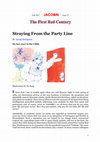Papers by Georgi Derluguian
Contemporary Sociology, May 1, 2001
... Page 19. ACKNOWLEDGMENTS xvii Luz-Moran of the ISA Secretariat in Madrid, who was charged wit... more ... Page 19. ACKNOWLEDGMENTS xvii Luz-Moran of the ISA Secretariat in Madrid, who was charged with collating the various regional reports. These papers were made avail-able by theISA for distribution at its biennial meeting held in Montreal in August 1998. ...
New York University Press eBooks, Jun 11, 2020
New York University Press eBooks, Dec 31, 2020
New York University Press eBooks, Jun 5, 2020

Jacobin Foundation, 2017
Illustrations by Jia Sung I knew that i was in trouble again when one cold Moscow night in early ... more Illustrations by Jia Sung I knew that i was in trouble again when one cold Moscow night in early spring of 1989, my dissertation advisor at the ussr Academy of Sciences, the prominent and splendidly named Africanist scholar Apollo Borisovich Davidson, called on the phone and asked me tenderly: Dear Georgi Matveevich (the manners of old Saint Petersburg intelligentsia prescribed politely addressing even students by their first name and patronymic and, of course, never as "comrade"), we all know that you do not value your life and your career. But I beg you explain, why you do not value MY life and career? Admittedly, in academic circles my sanity was regarded as somewhat suspect ever since my recent return after two years as an interpreter of Portuguese and Swahili in Mozambique. Such a reputation was not helped by my shaggy beard, unseasonal tropical tan, camouflage pants with so many handy pockets, and not in the least, the rumor that while doing my dissertation fieldwork I had nearly earned the Combat Red Star (Posthumous) in an encounter with the apartheid-supported "Contras." But since I had survived, there could be no decoration, only a rumor. At most, curious colleagues

Bronze Age is traditionally viewed as historical period in the third and second millennia BCE. My... more Bronze Age is traditionally viewed as historical period in the third and second millennia BCE. My key contention is that it is more meaningfully considered in geographic terms, as interconnected space of trade and cultural exchanges encompassing Afro-Eurasia but not Tropical Africa, let alone Australia and the Americas. The Bronze-age world-system extended from Scandinavia and British Isles to Egypt and Mesopotamia, from the Indus valley civilization and ancient Arabia to the Urals and western Siberia, possibly, also China and SouthEast Asia. Geologically, copper and tin as two metal components of bronze are randomly distributed on the planet which necessitated long-distance trade. In turn, the world trade in metals created whole cascades of logistical needs and opportunities. The consequences included the emergence of social complexity: chiefly powers, diplomacy, merchants, specialist coppersmiths and weapons-makers, professional warriors. New means of transportation emerged such as sailed ship and domesticated pack animals (donkey, camel, horse). The exchange in secondary products (wine, cloth, elaborate pottery) led to a revolution in conspicuous consumption. These theses are intended to generate a discussion about the earliest world-system, its morphology and flows. This may also extend to the comparative analysis of later world-systems known to us Antiquity, the Medieval 'Silk Roads', and modern capitalism.
TRAILS: Teaching Resources and Innovations Library for Sociology, Apr 26, 2010
TRAILS: Teaching Resources and Innovations Library for Sociology, Apr 26, 2010

Stanford University Press eBooks, Sep 7, 2016
Georgi Derluguian helps explain why Ukraine wound up with this oligarch problem in the first plac... more Georgi Derluguian helps explain why Ukraine wound up with this oligarch problem in the first place, identifying the cause as a Ukraine’s peripheral position in the world economy and the failure of its elites to cooperate for a larger good during the critical moment of the USSR’s collapse. Here a comparison with China proves useful. Derluguian argues that China succeeded because its relatively simple state allowed its leaders to work together to orient the country toward the needs of the global economy, while the complexity of Soviet institutions (including its division into multiple federal units) made such cooperation much more challenging. After the USSR collapsed, various “violent entrepreneurs” were able to take advantage of the resulting chaos to their own advantage, becoming oligarchs or state-based predators that have vested individual interests in subverting reforms.
Foreign Affairs, 2005
Georgi M. Derluguian is associate professor in the Department of Sociology and the International ... more Georgi M. Derluguian is associate professor in the Department of Sociology and the International Studies Program at Northwestern University. He is coeditor of Questioning Geopolitics. The University of Chicago Press, Chicago 60637 The University of Chicago Press, Ltd., London © 2005 ...
La Découverte eBooks, May 4, 2016
American Journal of Sociology, 2013
The Blackwell Encyclopedia of Sociology, Oct 22, 2020

Uploads
Papers by Georgi Derluguian